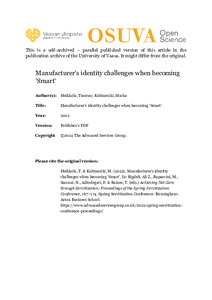Manufacturer’s identity challenges when becoming 'Smart'
Huikkola, Tuomas; Kohtamäki, Marko (2022)
Huikkola, Tuomas
Kohtamäki, Marko
Editori(t)
Bigdeli, Ali Z.
Rapaccini, Mario
Saccani, Nicola
Adrodegari, Federico
Baines, Tim
Aston Business School
2022
Julkaisun pysyvä osoite on
https://urn.fi/URN:NBN:fi-fe202301183485
https://urn.fi/URN:NBN:fi-fe202301183485
Kuvaus
vertaisarvioitu
©2022 The Advanced Services Group.
©2022 The Advanced Services Group.
Tiivistelmä
Purpose: The present paper was set out to understand manufacturer’s identity challenges when moving towards provision of product-service-software solutions.
Design/Methodology/Approach: This conceptual study uses illustrative cases to show certain aspects, challenges and practices regarding identity formation and building when manufacturers are becoming smart solution providers. The study builds on rich organization identity theory that is surprisingly underutilized in the extant digital servitization research.
Findings: The study suggests that when building and forming new identity, managers should be aware of potential issues, namely ambiguity among personnel, frustration among middle -managers, and confusion among key external stakeholders. This paper suggests that successful identity building requires dynamic capabilities not only inside the firm but across the boundaries, hence contributing to the crossroads of identity, capability, and digital servitization literatures.
Originality/value: For managers, this paper unfolds some useful practices how to mitigate identity inertia when managing strategic transition towards smart solutions.
Design/Methodology/Approach: This conceptual study uses illustrative cases to show certain aspects, challenges and practices regarding identity formation and building when manufacturers are becoming smart solution providers. The study builds on rich organization identity theory that is surprisingly underutilized in the extant digital servitization research.
Findings: The study suggests that when building and forming new identity, managers should be aware of potential issues, namely ambiguity among personnel, frustration among middle -managers, and confusion among key external stakeholders. This paper suggests that successful identity building requires dynamic capabilities not only inside the firm but across the boundaries, hence contributing to the crossroads of identity, capability, and digital servitization literatures.
Originality/value: For managers, this paper unfolds some useful practices how to mitigate identity inertia when managing strategic transition towards smart solutions.
Kokoelmat
- Artikkelit [2616]
